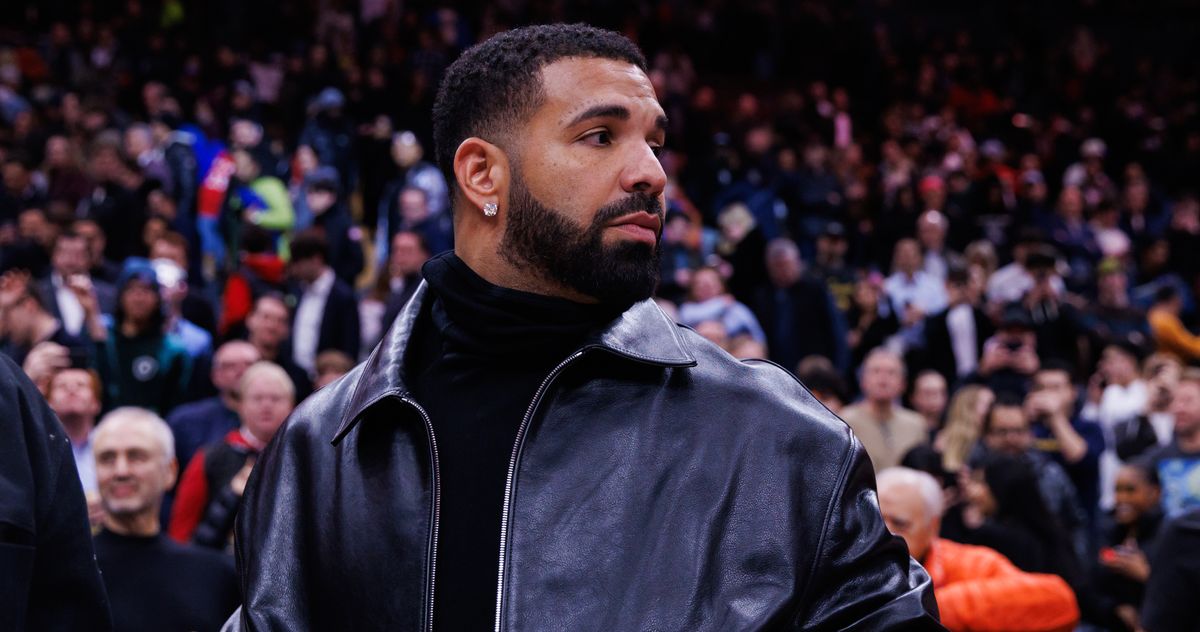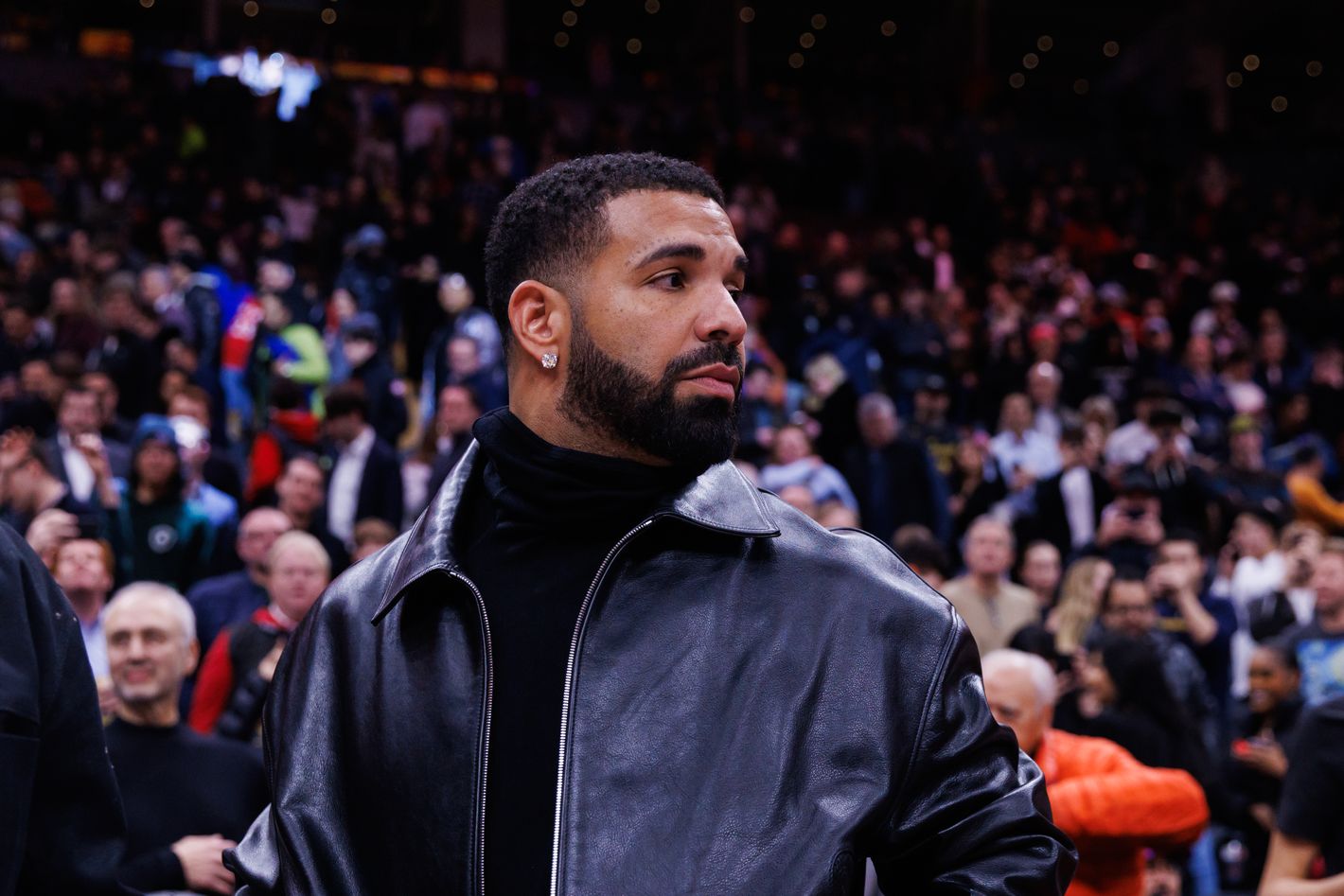The Boy Who Cried Wolf
Drake’s career is far from over, but the clock is ticking.


“Is it ‘Oochie Wally Wally’ or is it ‘One Mic’?
Is it ‘Black Girl Lost’ or shorty owe you for ice?”
—Jay-Z, “Blueprint2”
Kendrick Lamar’s “Not Like Us” has broken both wondrous and dubious ground: It’s a first-time/five-time Grammy-winning, Billboard Hot 100 topping rap diss almost destined to make the further history of being the first song of its kind performed at a Super Bowl halftime show. Meanwhile Drake, the subject of “Not Like Us,” is suing Universal Music Group for defamation, claiming his and Lamar’s label boosted lies unnaturally to hurt him. With an attorney who repped the literal pizzeria from Pizzagate in tow, Drake frames “Not Like Us” as a similarly malicious flowering of lies into real-world violence. But the filing otherwise comprises a mountain of internet commenters calling Drake a predator and colonizer, treating the roasts and illegal intrusions onto his property as equally deserving of the federal intervention. The gesture might rank as one of the most embarrassing in hip-hop history.
Drake’s suit is an uphill battle because it requires him to peel “Not Like Us” out of the context in which it exists to frame it as a fully believable attack, when it’s an aggravated crystallization of weeks of arguments spread out over songs where he himself reveled in unprovable claims. The filing avoids mentioning this part because acknowledging other records establishes the single as part of the rhetorical tradition of the rap diss. Collecting a mountain of reactions to “Not Like Us” attempts to document listeners taking lyrics at face value. The song made enemies out of posters, who see a tough talker clamoring for cruder and faster responses only for him to contact the feds in fear after a shooting at his mansion. But it’s more useful to process what looks like the plug being pulled on Drake’s mafioso era as the latest in a litany of fluid evolutions for a persona that’s always been nervously on the move. Presented with an obstacle, like fans calling him soft or fellow rappers questioning his authorship and authenticity, Drake adapts, shifting into a more appealing shape. His transformation into a ‘10s and ‘20s industry/internet terror — trackable in the pivot from “I just wanna be successful” to “I know way too many people here right now that I didn’t know last year” to “I got enemies” — mirrors a stiffening of modern men in an era increasingly defined by division and displays of dominance. “Not Like Us” is the hardest hit his reputation has taken. Can he evolve again?
Facing a hard time for being different, not originally the image of a hip-hop tough-guy, Drake built himself hard, like Chiron in 2016’s Moonlight.
The confident rapper, R&B singer, indie-rock admirer, and loverboy of 2009’s So Far Gone was most of a decade in the making. Prone to hero worship early on, he hashed out his style in public, dabbling in rap while working on the Canadian teen soap Degrassi: The Next Generation. Early works pitched diaristic stories about insecurities: 2006’s “S.T.R.E.S.S.” recalled sneaking around with a girl whose parents didn’t approve of her having a biracial boyfriend. 2007’s “Closer to My Dreams” huffed “I’ve been Urkel for some years, it’s better being Jaleel.” So Far Gone, one of that decade’s high watermarks of blog-era taste and jocking-for-beats curation, ramped the transformation up, getting cagier about the oversharing and locating a vulnerability that didn’t scan as corny. The guy the American masses met in 2009 had already worked out a sound, approaching the sad-robot pop of Ye’s 808s & Heartbreak from the chilly arrogance of boardroom Jay.
Hip-hop heads didn’t always respect the swing of the pendulum, though. 50 Cent had just tucked Ja Rule’s chart-topping career into an eternal slumber in the mid-aughts, framing him as a softie and a crooner. Drake’s first five years as a Cash Money commodity dovetail with fallout from those sensibilities. He saw ruthless ribbing about his masculinity and Blackness that slotted his feelings-centric songwriting into the age-old stereotypes about the sensitivity of nerds and light-skinned Black men. While complaints mounted in rap and streetwear circles about men in tight jeans, the romantic-turmoil trap of Take Care’s “Cameras / Good Ones Go” and the complimenting-women rap of “Best I Ever Had” were fairgrounds for fights about emasculation.
In response, Drake surrendered to the inevitability of being memed, and videos started to plan for bits being carved out for ironic consumption. By 2013’s Nothing Was the Same, he had bossed up slowly while communicating that he didn’t take himself too seriously. “Started from the Bottom” looks like a reel of suggestions for GIFs now; the seven-minute “Hold On, We’re Going Home” film yielded footage of Drake letting off machine gun rounds in a teardrop-encrusted balaclava. He became familiar with what everyone was listening to, and if you were making fun of him, he wanted in on the action. Fans could hear Drake’s voice flutter through half a dozen genres, and if you hated him, the music video gift-wrapped the media for your shitposts. The bombastic “Worst Behavior” hovered in the same slipstream; you could laugh off all the barking or contend with the flex of familial ties to Black American Memphis culture via Drake’s father Dennis Graham’s suit and strut. The once genteel part-time rapper of “S.T.R.E.S.S.” was suddenly puffing his chest and cataloging ideological gains: “This ain’t the son you raised who used to take the Acura / 5 AM then go and shoot Degrassi up on Morningside.”
The fast flowing first few incarnations of Drake feel footloose in the long morass of the current one, where he has collected a long list of enemies littered with former heroes and past and future friends. When the impulsive Philly rapper Meek Mill aired Drake out for hiring cowriters but choked in every attempt at a diss track, the OVO Sound boss revealed how much of a master of his own narrative he’d become. He pulled ahead inexplicably, calling Meek a snitch and guessing against logic he’d never catch a great response. The outlier soon dominated the playbook. A grumpier artist loosed by “Charged Up” and “Back to Back” ached to clash. Emboldened by the relative ease with which he’d dispatched his first street rapper, Drake never stopped picking fights, using whatever wedge worked when he felt wronged. Hand-me-down beef with Pusha-T, a longtime foil to Lil Wayne, exploded after Drake mentioned Pusha’s fiancée by name and challenged the street bona fides he’d heard as a Clipse fan. Megan Thee Stallion seemingly landed on his bad side in her contract dispute with Rap-A-Lot Records founder J. Prince, one of rap’s fiercest Drake defenders; after Stallion accused Ontario rapper and singer Tory Lanez of shooting her in 2020, Drake made Lanez a loud cause célèbre.
The more spiteful Drake could smell a world of buff, misogynist grifters taking hold and made sure to set up shop where the audience would be. The purview of his catalog narrowed, focusing on refining a reputation as a petty king in rap and in relationships. He’s the guy you bump when your girlfriend is getting on your nerves or when you want to pretend to have opps. Records that used to bristle with a love of craft and earnest examinations of the artist’s fears now offer the gift of ear hustling a man exercising the freedom to center himself and burn bridges. Facing a hard time for being different, not originally the image of a hip-hop tough-guy, Drake built himself hard, like Chiron in 2016’s Moonlight. He is the star he sees the moment in world history begging for. Stream counts say this villain incarnation was a runaway success, but the spat with Kendrick Lamar highlighted the points of frustration left in its wake.
“Not Like Us” blossomed from another long-simmering and quixotic season of unpleasantness. Kendrick Lamar’s thesis succeeded, and left a faint feeling of a meddling giant violently toppled, because it treated Drake like the aspirant student he always was. It flattened his narrative, reframing him as a self-conscious phony who built a cold but illusory veneer through cavorting with Southern drug dealers. The cut threaded truth, rumor, suspicion, and nonsense into a web of shame too vast and sticky to escape. It didn’t matter what wasn’t true; there were too many messy points of contact. These are Drake’s own war tactics. “Not Like Us” at the Super Bowl will hit him the way the meme-filled OVO Fest performance of “Back to Back” did Meek: Another wise guy got ahead of himself, setting the stage for a foe to posterize. The hope that shame will facilitate growth is difficult to gauge. The best that anyone can tell, Drake hates LeBron James now because the Laker legend was seen vibing to Kendrick’s song. Every play feels reactionary and doomed. The position is untenable.
Drake bears some of the responsibility for relations rapidly descending into chaos. He became this calculating, self-styled aggressor who delights in frenetic subliminals and attempts to frazzle his peers by going after everything they hold dear. He tried all of this in the leadup to “Not Like Us” — as with Pusha and Meek — and got rinsed by the more diabolically compelling presentation. (“This supposed to be a good exhibition within the game,” “Meet the Grahams” notes. “But you fucked up the moment you called out my family’s name.”) His strategy of winding you up and tapping on his watch has now lost him more heavyweight bouts than it ever won. Maybe he’ll think twice before making a beeline to the rudest sentence he can think to say to someone.
But Drake’s career is, to quote the single from his debut album Thank Me Later, far from over. He has a new album coming: $ome $exy $ongs 4 U, a collaboration with OVO Sound signee PARTYNEXTDOOR, is set for Valentine’s Day release, bookending So Far Gone. Drake was slippery enough to progress from playing a school shooting victim on TV to rapping about having gunmen on retainer. “I will fuckin’ force a few shots like a vaccination,” he said in For All the Dogs’ “Red Button.” “Niggas fuckin’ call me up to cap, this not a graduation.” He beefed up too much, like the transatlantic male players his music reaches. They must all decide whether to spend the rest of their lives chasing masculine paradigms that made them grow callous in character to keep up, or quit aching to assert dominance over each other. The clock’s ticking.
Related








